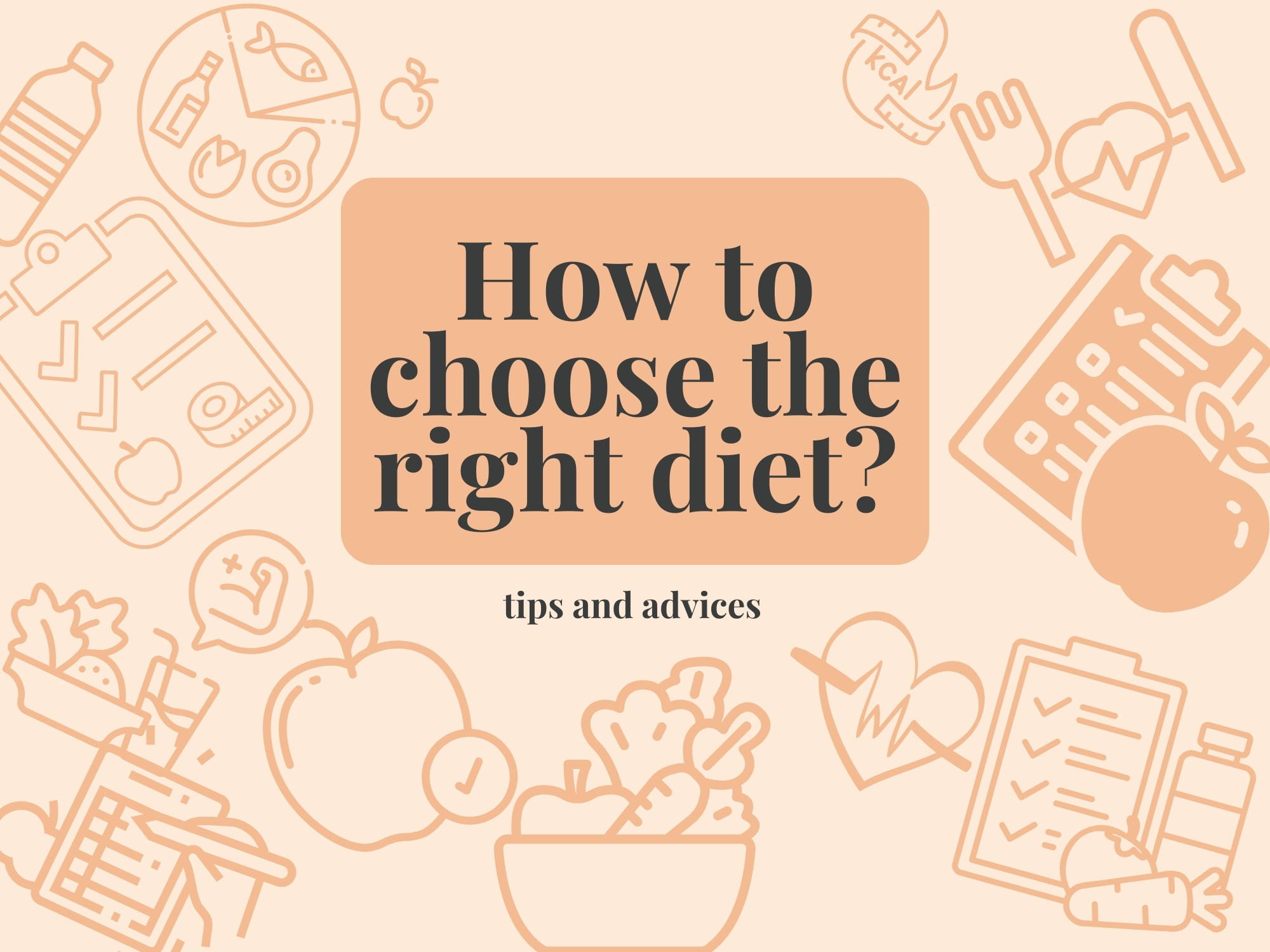
How to choose the right diet?
What diet is effective? How to choose the right diet? Which diet is the best? These are common questions many people ask. Are you wondering too? Check it out!
Choosing the right diet in today’s world, filled with various nutritional advice and dietary trends, can be a real challenge. Should you choose a low-carb, vegan, or maybe a Mediterranean diet? Each promises health and better condition, but the key is to find a way of eating that is best for your body, lifestyle, and personal health goals. This article aims to guide you through the process of selecting a diet that suits your individual needs. We will cover recognizing your nutritional goals, understanding different types of diets, and the importance of consulting with experts. We will examine how experimenting and adapting your diet can help you find the perfect solution that will not only bring expected health effects but also be feasible to implement and maintain in your daily life. How to find the best diet for yourself? Choosing a diet is not just a decision about what will be on your plate. It’s a decision that can affect your overall well-being, energy, and health. Let’s go through this process step by step to find the diet that will be best for you.

Recognizing your needs and goals
A key step in choosing the right diet is understanding and recognizing your health needs, dietary preferences, and personal goals. It’s an individual journey that requires introspection and honesty with yourself. Here are some aspects to consider:
- Health status assessment: Think about your current health status. Do you have any specific conditions that require consideration in your diet, such as diabetes, food allergies, or heart problems? Consulting with a doctor can be helpful in assessing your health needs.
- Analysis of eating habits: Take a look at your current eating habits. What foods do you choose most often, and how do they affect your well-being? Understanding your patterns can help choose a diet that will be more natural and easier to maintain.
- Setting nutritional goals: Consider what you want to achieve by changing your diet. Is your goal to lose weight, improve physical fitness, feel better, or perhaps support a specific health condition?
- Culinary preferences and limitations: Consider your taste preferences and any limitations. A diet that doesn’t match your culinary likes may be difficult to maintain in the long run.
- Realistic expectations and possibilities: Only undertake what is feasible to accomplish. Consider your professional, social, and family life – the diet should harmoniously blend with your daily routine.
Recognizing your needs and goals is the first and most crucial step in choosing a diet. It allows you to choose a way of eating that will not only be effective but also enjoyable and balanced.
Consultation with experts
When choosing a diet that best suits your needs, consulting with experts can be invaluable. Dietitians and doctors have the knowledge and experience that can be crucial in tailoring a diet to individual health requirements, dietary preferences, and life goals.
- Importance of professional advice: A dietitian or doctor can help assess your current health status, recommend appropriate tests, and advise on the most beneficial dietary changes. They can also assist in identifying and managing potential health risks associated with specific diets.
- Individualized nutritional plans: Experts can help create a personalized nutrition plan that takes into account your unique needs, goals, and taste preferences, increasing the chances of successful and long-term adherence.
- Support and motivation: Regular consultations with an expert can provide valuable support and motivation, as well as help in monitoring progress and making necessary diet adjustments.
- Utilizing modern tools: In the age of technology, it’s also worth using available health and dietary apps. For instance, our app offers personalized nutritional advice, meal plans, and progress tracking.
Remember, any diet change should be thoughtful and tailored to your individual needs. Consultation with experts not only ensures safety but also facilitates finding the most effective and enjoyable path to achieve your health and nutritional goals.
Integrating diet into daily life
Incorporating a new diet into daily routine can be challenging but is key to achieving long-term health and nutritional goals. Here are some tips for effectively integrating a diet into your everyday life:
- Realistic approach: Choose a diet that you can easily weave into your daily life. Consider your responsibilities, daily schedule, and product availability.
- Meal planning: Organize your meals in advance. Planning helps avoid impulsive food decisions that may not align with your chosen diet.
- Simple recipes: Find simple, quick-to-prepare recipes that make sticking to your diet easier and less time-consuming.
- Smart shopping: Create shopping lists that align with your diet to avoid temptations at the store. Focus on buying fresh, unprocessed products.
- Small changes: Instead of making drastic changes right away, start with small steps that gradually bring you closer to full adherence to the diet.
- Social support: Share your experiences with family and friends. Support from loved ones can be invaluable in sticking to your goals.
- Flexibility: Allow some flexibility in your diet, especially during social gatherings or special occasions.
- Monitoring progress: Regularly track your progress and diet effects, but remember to do so in a healthy and balanced way.
Remember, integrating a diet into your daily life takes time and patience. The key is finding a balance that allows you to enjoy food while adhering to dietary guidelines for better health and well-being.

Remember, integrating a diet into your daily life takes time and patience. The key is finding a balance that allows you to enjoy food while adhering to dietary guidelines for better health and well-being.
Choosing the right diet is a decision that can significantly impact your health, well-being, and overall quality of life. It’s crucial to approach this process thoughtfully, considering personal health needs, nutritional goals, taste preferences, and lifestyle. Recognizing your own needs and goals is the first step to finding the most beneficial diet for you. Understanding different types of diets, from standard to specialized ones like vegetarian, vegan, or ketogenic, will help you make an informed choice.
Consulting with experts like dietitians or doctors is invaluable in the process of choosing and adapting a diet to individual needs. Professional advice can ensure safety, provide support, and facilitate progress monitoring. Integrating a diet into everyday life requires a realistic approach, planning, flexibility, and social support. Remember, every change takes time, and success lies in consistency and the ability to adapt to new dietary habits.
In summary, the choice of diet should not be dictated by fleeting trends or unverified promises of quick results. Instead, it should be based on a solid foundation of knowledge about one’s own body and needs, supported by professional advice and a healthy approach to nutrition. Your dietary choice should benefit both the body and mind, leading to better health and life satisfaction.
Our website is a dietary blog where we post daily:
– nutritional advice
– breakfast recipes
– lunch recipes
– dinner recipes
– snack recipes
– dessert recipes
Related topics – post: how to choose an effective diet, which diet is the best, best online diet, types of diets, how to choose a diet, how to choose a diet for yourself, how to tailor a diet to yourself, diet selection, how to choose a way of eating, dieting for weight loss, dieting
Related topics – blog: dietary recipes, fit recipes, healthy recipes, dietary recipe blog, fit recipe blog, healthy diet recipes, healthy snacks, recipes with pictures, recipes with caloric content, recipes with macronutrients, free meal plan, online diet, online diet cost
